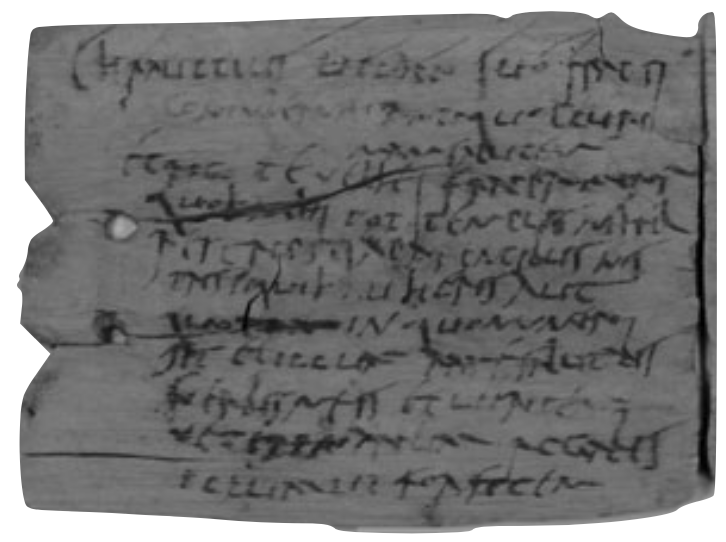55 Vindolanda 310
Chrauttius writes to Veldedeius to admonish him for neglecting their correspondence and to inquire about mutual acquaintances, including a woman named Thuttena. Their relationship is characterized in fraternal terms but hints in the letter suggest that they were not related (see commentary ad loc.). A second hand, likely Chrauttius himself, wrote the valediction, while most of the letter and the address was written by a scribe (albeit one with rather ugly handwriting!)

Text
Chrauttius Veldēiō suō frātrī contubernālī antīquō plūrimam salūtem. et rogō tē, Veldēī frāter — mīror quod mihi tot tempus nihil rescripstī — ā parentibus nostrīs sī quid audiēris aut quot in quō numerō sit et illum ā mē salūtābis{s} verbīs meīs et Virīlem ueterīnārium rogābis illum ut forficem quam mihi promissit pretiō mittās per aliquem dē nostrīs. et rogō tē, frāter Virīlis, salūtēs ā mē Thuttenam. Rescrībās nōbīs cum [Velbutēius?] sē habeat opt<ō> sīs fēlīcissimus. ualē.
<Back>
Londīnī. Veldedēiō equisiōnī cō(n)s(ulāris) ā Chrauttīō frātre
Commentariolum
A complete diptych (only the right-hand tablet pictured), with addressee written, as usual, on reverse of the right-hand tablet. The level of literacy evinced by the letter is high, with only a few vulgarisms and orthographical oddities, although Chrauttius writes in a formulaic language that borders on the cliché.
1 Veldēiō suō: the more formal address refers to the recipient as Veldedius. Is Veldeius a familiar nickname, like Tom for Thomas?
frātrī contubernālī antīquō: at the conclusion of the letter, Chrauttius will again address Veldedeius as brother, but this form of address is common in Latin epistles and need not imply they were related. The characterization of Veldedeius as contubernālī antīquō confirms the symbolic use of frāter.
2 Veldēī: the regular vocative form of -ius nouns.
mīror… rescripstī: a parenthetical to chasten Veldedeius for his failure to write
tot: the use of the adverb in place of an adjective (e.g., multum or longum) is a common feature of vulgar Latin.
rescripstī = rescrīpsistī.
ā parentibus nostrīs: must refer to an esteemed elder (note the illum in the next line and the question about where parēns noster is stationed).
quid: “after nōn, nisi, num, and nē….”.
3-4 Virīlem ueterīnārium: Chrauttius asks for Veldedeius’ help in completing a transaction with Virilis the veterinarian.
4-5 per aliquem dē nostrīs: an intermediary will convey the shears from Virilis to Chrauttius.
5 rogō tē frāter Virīlis: the letter now switches to address Virilis directly; note that Chrauttius had asked Veldedeius to convey a message to Virilis verbīs meīs.
6 Velbutēius: the text is uncertain but Chrauttius clearly asks how another person is doing.
8 Londīnī: this must be the location where the letter was delivered. Veldedeius must have brought it with him when he returned to the frontier, possibly after traveling to London to guard the provincial governor.

